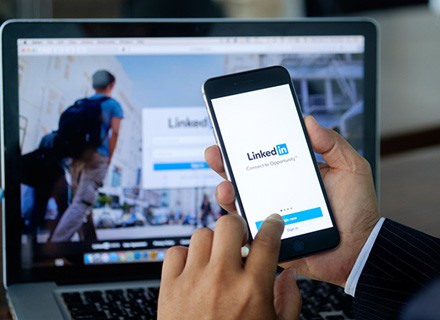Amid the Microsoft-backed OpenAI ChatGPT making waves, researchers have now come across an artificial intelligence-powered malicious ad campaign, targeting the LinkedIn profiles of businesses.
Cybersecurity researchers from SafeGuard Cyber recently came across a LinkedIn advertisement profile promoting a whitepaper that would help sales professionals optimize their operations and close more business deals, reports TechRadar.
The SafeGuard Cyber researchers have described the ad’s creative as “bizarro”. It features a colour pattern in the lower right corner, which is usually seen on images produced by OpenAI’s Generative AI model Dall-E.
Dall-E usually works with text-based prompts. Once the user tells the AI model about his/her image requirements, the generative model produces the photo accordingly.
As per the researchers, the ad copy invited the readers to sign up, and in exchange for their personal data to acquire the whitepaper.
The ad creative was set up by an account named “Sales Intelligence”, which the SafeGuard Cyber researchers found suspicious.
Upon investigating further, the company page was found largely blank, and only hosted a link that routed the visitors to an Arizona jewellery store. These researchers are now speculating that the link was just added to fill the mandatory fields in order to set up the page. The whitepaper was found to be non-existent as well.
People signing up for the product may end up sharing their personal details hosted on LinkedIn, such as email and contact numbers, with the threat actors. These details can later be used in different phishing and social engineering attacks.
“Encountering this fake LinkedIn ad was a significant reminder of new social engineering dangers now appearing when coupled with Generative AI,” the researchers said.
While the researchers focused on the image, they also think that the ad copy is most likely an AI-generated one.
This news comes four months after the ‘Fake Companies’ phenomenon on the job hunting site.
A KrebsOnSecurity blog in October 2022 said that the cyber attackers were using artificial intelligence and creating bogus profiles and stealing job descriptions from the original accounts.
The tech website examined a series of such profiles back then, with all of them claiming to be Chief Information Security Officer (CISO) roles at various Fortune 500 companies, including Biogen, Chevron, ExxonMobil and Hewlett Packard.
KrebsOnSecurity double-verified the statements from LinkedIn users and readers, while forming its assessment.
Even invite-only LinkedIn groups were attacked by these scammers.
As per Cybersecurity firm Mandiant, cybercriminals were using these bogus accounts to get into cryptocurrency firms, before drying up the target companies’ funds. Experts had even touted this as some sort of romance scam, where victims are lured into fake crypto platforms.
There has been recent evidence of threat actors using fake LinkedIn accounts to spread malware and viruses, with a focus on the crypto sector.
In response to the KrebsOnSecurity report, LinkedIn in 2022 informed about introducing the concept of domain verification in order to combat such menaces.

